Your experiences with money make up 0.00000001% of what’s happened in the world, but 80% of how you think it works
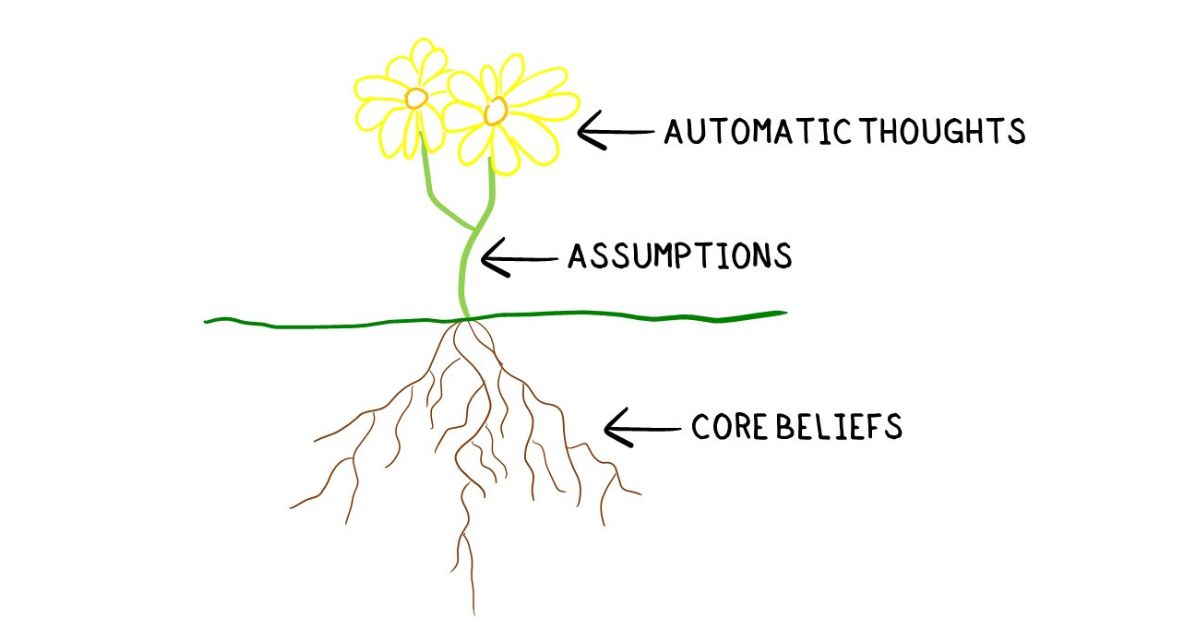

Doing well with money isn't necessarily about what you know. It's about how you behave. And behaviour is hard to teach, even to really smart people.
Getting rich and staying rich require different things that require different skills.
Have you ever wondered why you do what you do?
Or calculated the actual cost of running on autopilot?
Best-selling author Morgan Housel says "humility is a superpower that prevents overconfidence."
Often, we have scripts running in our minds that keep us from doing what we know we're supposed to do.
These may manifest as inertia, inaction, wrong-action or cognitive bias - often sending our lives and finances way off course.
In my day job I see this manifest in all types of ways - an aversion to any form of actual future planning - fear, doubt, greed, impatience and many other emotions.
When these scripts are about money, they're sometimes referred to as money scripts.
Otherwise, you can think of them as schemas or core beliefs. Core beliefs shape our world, including our thoughts, and without investigating, we may be living on autopilot.
Core beliefs are deeply held assumptions
"My head won't leave my head alone, and I don't believe it will until I'm dead and gone." - Dave Matthews Band, "Rhyme and Reason"
Think of money scripts as core financial beliefs.
Your core beliefs, whether about money or not, are beliefs you have that were created in your mind via your experience.
Most of us didn't learn life lessons explicitly.
Instead, we learned implicitly by observing the world around us. We made sense of the world, including money, by watching and creating little rules.
They could be if/then rules like:
- If I talk about money, then there will be a fight
- If I fail, then I will be embarrassed
- If I work harder, then I will make more money
Other rules could be absolute statements, invoking words like "should" or "always":
- I should just be happy with what I have
- People always stab me in the back
- Good things never last
As we develop our rules (core beliefs), we test them to see how accurate they are.
Of course, we create these rules when we're young and don't have fully developed brains that can deal with complexity, so we take shortcuts. We notice when something confirms our rule. We don't notice when something doesn't.
Plus, even if all our rules were 100% correct (they aren't), we only have a sample size of one - the family system in which we grew up.
Nonetheless, these core beliefs develop and shape our worlds. They give us a sense of coherence, helping us make sense of the world.
They are like the roots that drive our assumptions and thoughts.
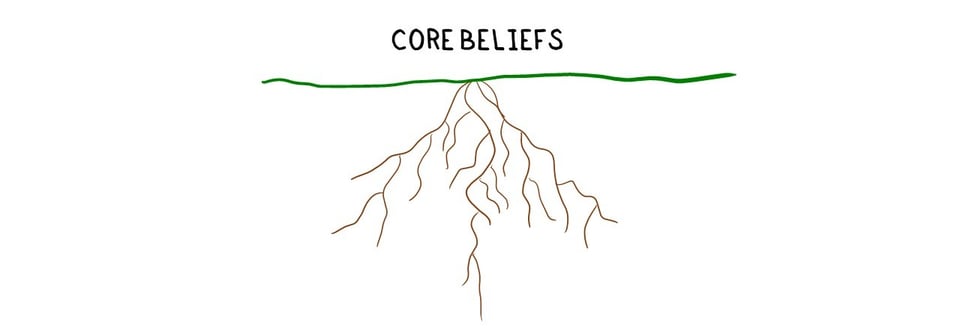
Core beliefs represent how, at least to us, the world works.
They're deeply held assumptions that we never challenge. They're nothing more than assumptions based on our experience, but we don't treat them as assumptions. We treat them as FACTS because that's what they feel like to us.
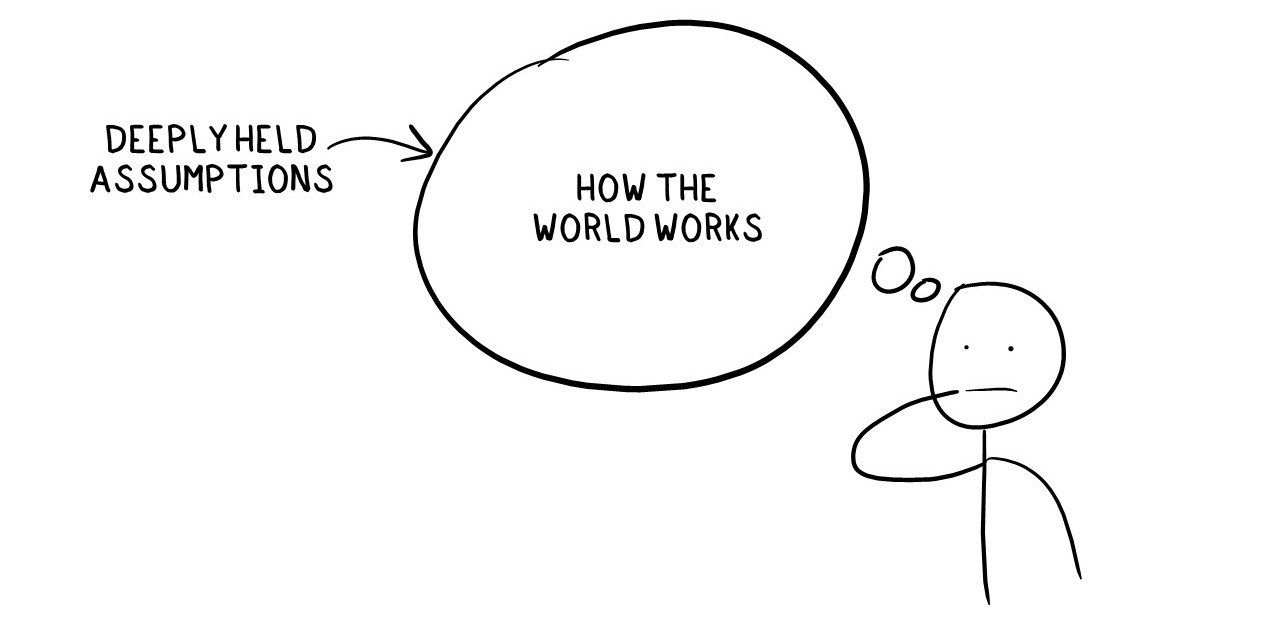
In your world, most things happen inside the "How the World Works" circle, because you created that circle based on your life.
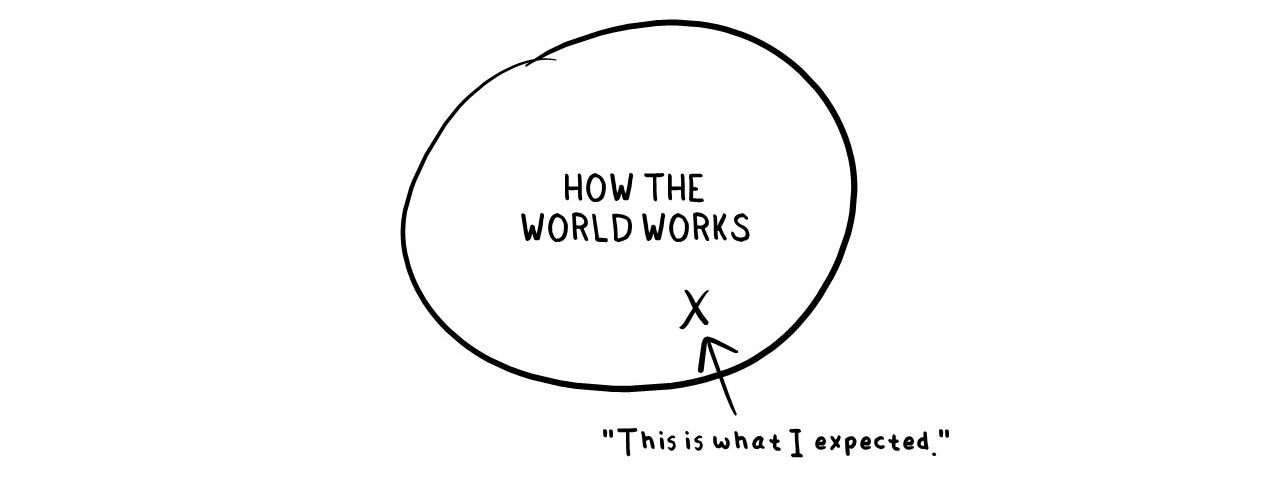
Occasionally, something will happen that's pretty close to how the world works, but it's slightly unusual.
When this happens, sometimes we just forget (read: we don't remember it because then we'd have to reshape our circle). Other times, we adjust our circle to account for the new data.
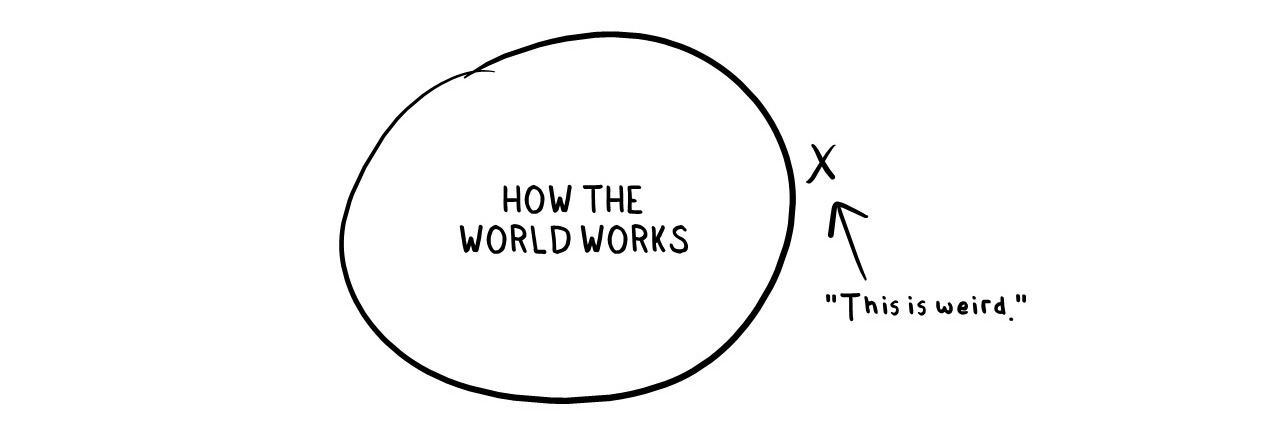
However, other times, things happen that are so outside of what we think should happen that they rock us. Our lives are completely shaken, and it doesn't make sense. It plays with our sense of coherence and makes us feel like life has lost meaning.
These major changes in our lives cause us to question our deeply help assumptions about the world and may be the only times we ever think about our core beliefs.

Core beliefs are shaped by experience and biases
Your core beliefs were created and shaped by what you've seen and experienced.
You were influenced by the home in which you grew up, of course. But you were also influenced by your neighbours (those pesky Joneses), the customs of the country you grew up in, any religious customs that were around, and even by the media.
Think of your core beliefs as a big screen or a filter.

Your core belief filter sits between you and the world.
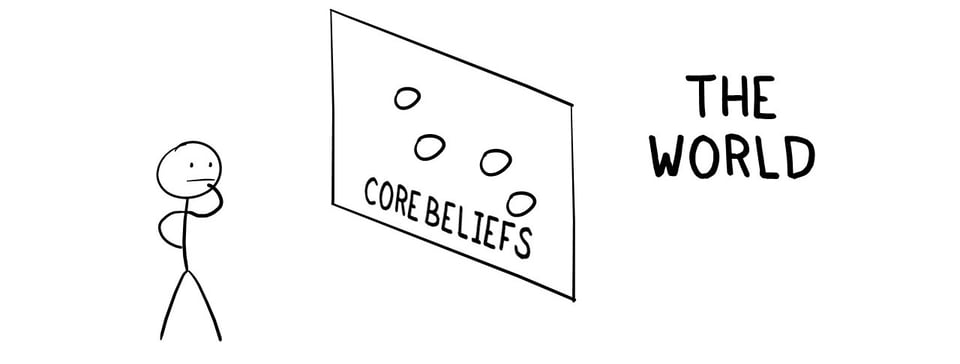
What you experience today is filtered by your core beliefs. You notice what you notice because of your core beliefs and deeply held assumptions. You don't notice other things for the same reason.
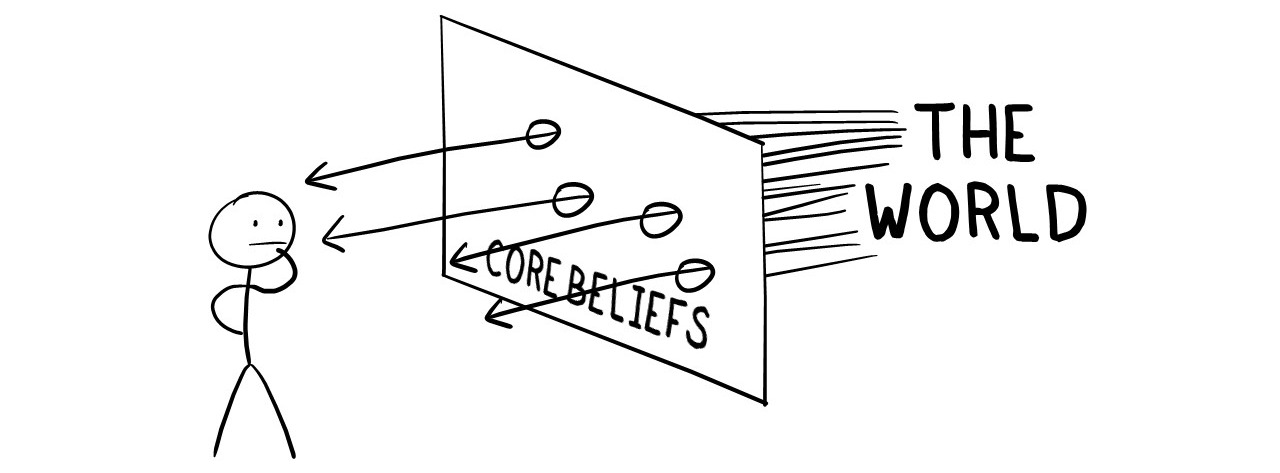
Your core beliefs lie deep within your elephant.
Let me explain.
Author Jonathan Haidt, in his book The Happiness Hypothesis, writes about our subconscious mind being like an elephant. This's where instincts come from, and instincts are hard-wired. They come from both nurture (your experiences) and nature (the genes you inherited).
Your core beliefs are so much a part of you that they lie hidden from conscious view - in the elephant.

Sitting on top of your elephant is a rider. The rider represents your conscious mind. This is the part of the brain that you think about when you use first-person pronouns, like I and me.
In a perfect world, this would be a good system. The elephant can take care of what it needs to without you having to use up your conscious thought. It can keep the rider focused on important things.
Sometimes, though, the rider is unaware of some of the motivations of the elephant.
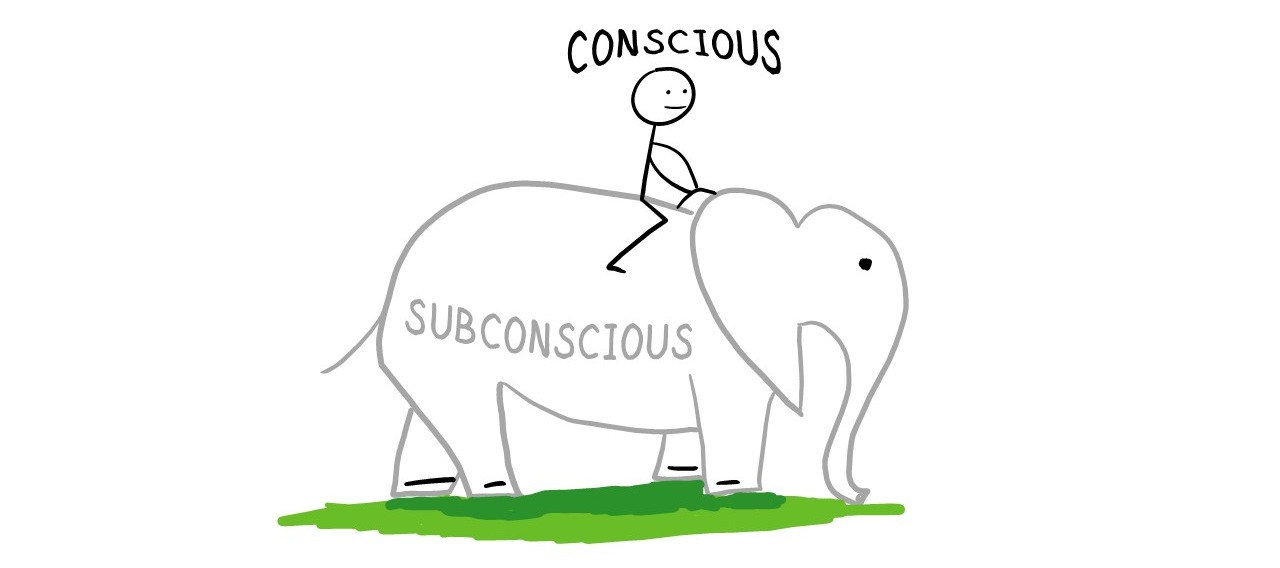
The elephant makes about 95% of our daily decisions. These "decisions" happen underneath conscious awareness; they're automatic.
The rider represents deliberate thought and action.
So, whereas the elephant is the part of us that's on autopilot, the rider is the thinker.
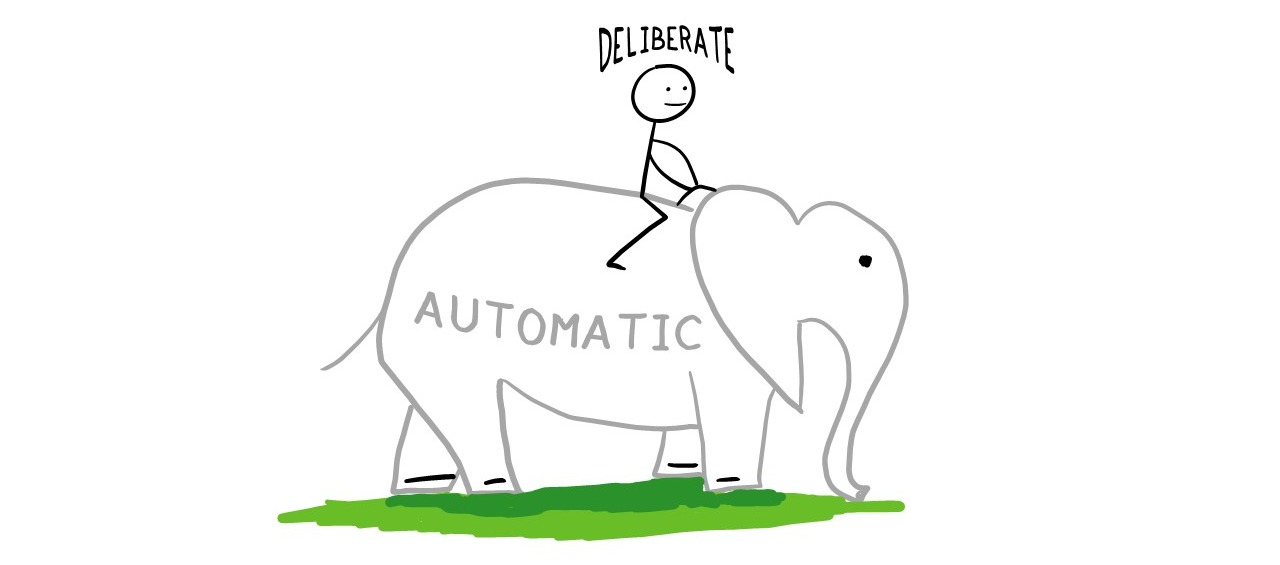
The elephant learns by experience and shapes your core beliefs. But the elephant takes shortcuts. The elephant is heavily influenced by a couple of key biases.
The first is the negativity bias. The negativity bias says that we will focus more, remember, place more weight on, and more quickly recall negative experiences and aspects. There are some evolutionary reasons for this, but suffice it to say that our ancestors who didn't pay more attention to threats than opportunities didn't survive to become our ancestors.
This matters because our experiences are being run through the negativity bias in the creation of our core beliefs. Thus, our core beliefs have a tendency to be overly negative and otherwise tilted toward keeping us safe.
Safe, in this context, refers to not taking any risks.

The second key bias is called confirmation bias. Confirmation bias is the tendency for us to notice and remember things that confirm what we already think. Conversely, we won't notice things that are contrary to our beliefs.
Note that this isn't done intentionally. This isn't the realm of the rider. The elephant takes control here, too.
After the elephant shapes our initial beliefs, it will notice times when those beliefs were true and fail to notice times when they weren't true. When that happens, it strengthens those beliefs.
So we have a situation where our subconscious mind creates beliefs based only on what we've experienced, passes those experiences through a negative filter, and then sees only that which confirms the belief.
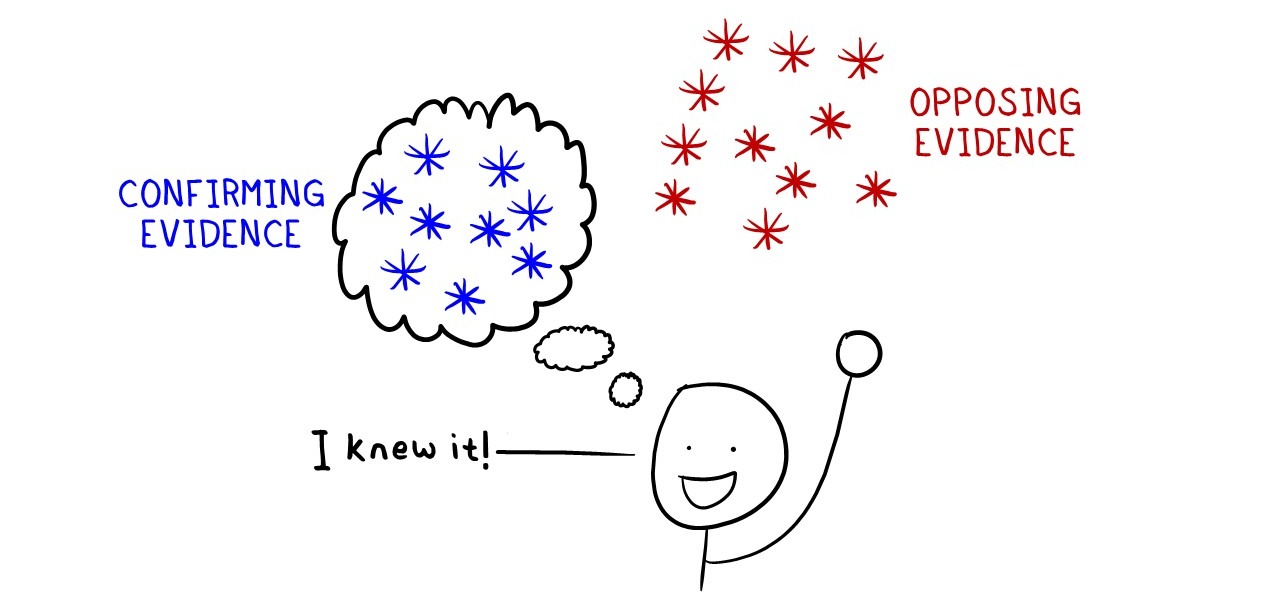
Core beliefs shape automatic thoughts
The relationship between core beliefs and automatic thoughts is that our core beliefs - the roots - lead to our deeply held assumptions - the stems - which lead to our automatic thoughts - the flowers.
Automatic thoughts are those stories that run in our heads all day long. Many people refer to this as their inner critic.
Though it might seem like a linear relationship between core beliefs and automatic thought, it's more like a circle.
Your core beliefs are what shape your automatic thoughts, of course, but those automatic thoughts shape your existing core beliefs and create new ones.
Core beliefs generate automatic thoughts via deeply held assumptions. Those automatic thoughts give rise to confirmation bias and thus reinforce your core beliefs.
The process of reinforcing your core beliefs is like strengthening the roots. It makes your core beliefs even stronger.
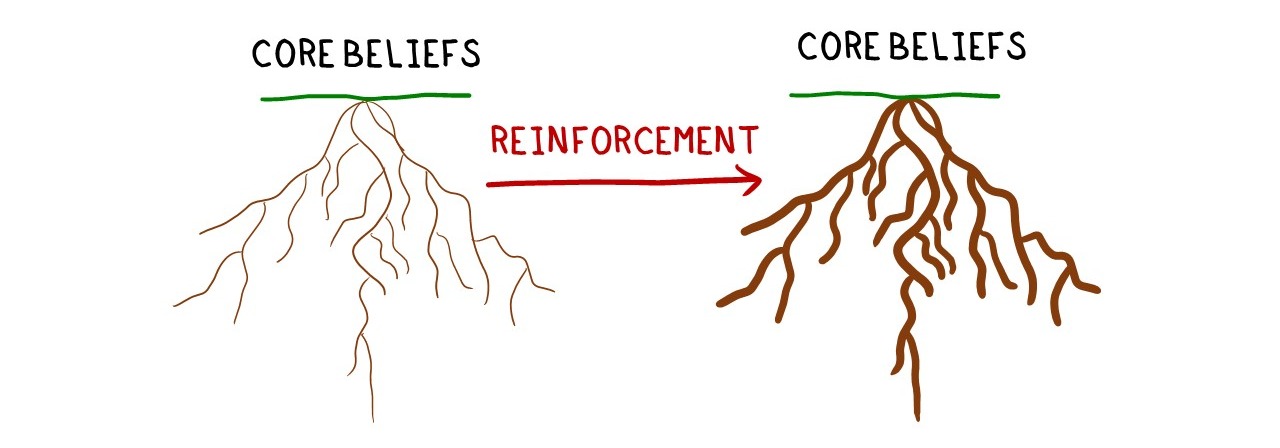
Then, those stronger core beliefs generate new automatic thoughts that reinforce the beliefs, and so on, and so on, and so on...
Investigating core beliefs
The best way to ensure your core beliefs are being helpful, is to investigate them.
Experientially, it feels like something happens that makes us do something.
We were "triggered" into some behaviour.
In other words, it feels like some event leads to a behaviour.
It doesn't need to be a behaviour. We can feel as though something triggered an emotion, like anger, sadness, guilt, and so on.
Let's group behaviour and emotions together and call it consequences. It feels like something happened that led to that particular consequence.
However, the same event can happen to different people, all of whom have different consequences. One person might experience anger, another might cry, a third person might walk away, while a fourth person might not care.
It turns out there's a step between the event and the consequence. These triggers are your core beliefs. Your core beliefs shape how you interpret the event and what the behaviour or emotion will be.
Investigating your core beliefs is first about becoming more aware of your behaviour and emotions. Once you know more about how you act and feel, you can then ask yourself what happened right before.
That's the event, or the trigger. Even if you stop the process here, you still gain valuable insight into your triggers.
The next step is arguably the more difficult.
It's asking yourself WHY.
Why did that event cause that consequence?
The answer to that question gets you closer to the core belief that represents your interpretation of the event.
There are insights each step of the way because learning what your core beliefs are and becoming more aware of them robs them of some of their power.
So even if you stop the process here, you'll be in better shape than most.
A further step to gain more insight is to question the core belief. Is there evidence for it? Is there evidence against it? Is it always true? What if a loved one told you they were in the same situation; what would you say to that person?
Without investigating, we're at the whim of whatever is happening to us.
We're living our lives on autopilot.

By investigating, we can put space between stimulus and response. Growing the space between what happens to us and how we react takes an automatic reaction and turns it into a conscious choice.

In other words, we bring more of life into the realm of the rider. Once the rider knows about what's happening, the rider can decide if the automatic thoughts, deeply held assumptions, or core beliefs are helpful or unhelpful in a particular situation.
It helps the rider make better choices.
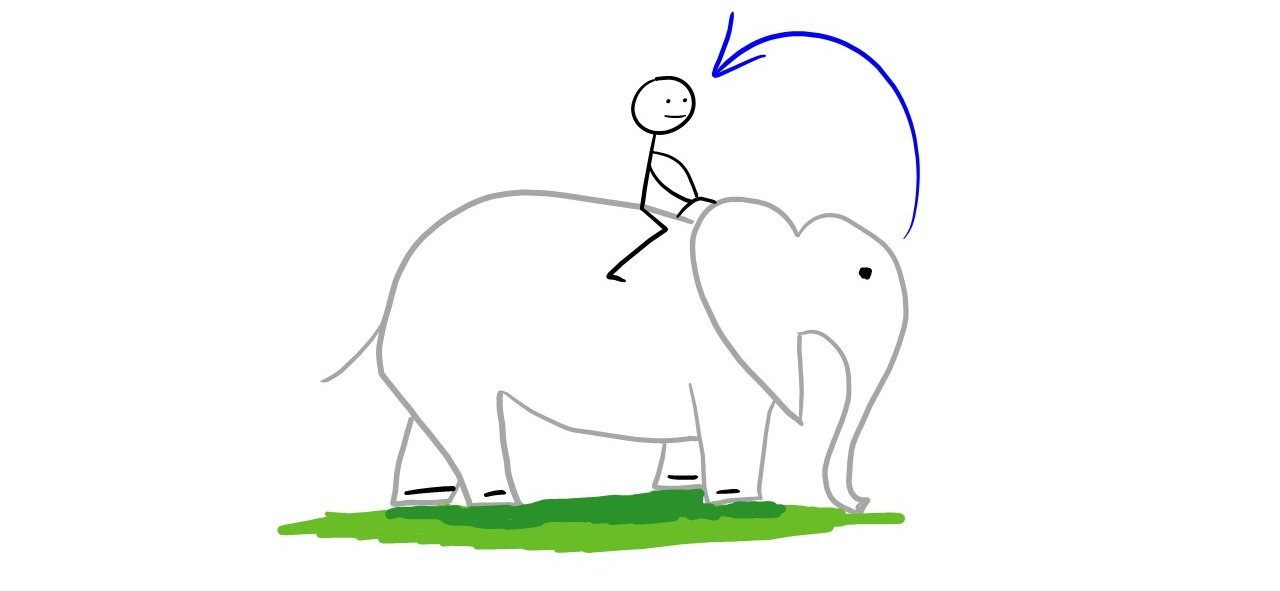
Understanding your core beliefs, including money scripts, is about living life while knowing you're living life. It's about living on purpose, with purpose.
Massive thanks to Derek Hagen for his images and inspiration.

